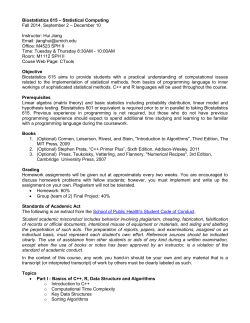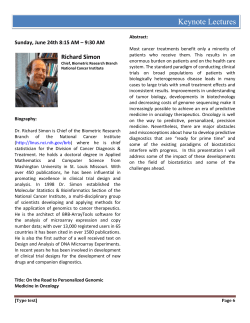
College of Public Health & Health Professions Course Syllabus
College of Public Health & Health Professions Course Syllabus PHC6937: Biostatistics Journal Club Spring 2013 Time: Monday, Period 9 (4:05 – 4:55) Location: Ustler 101 Course Website: TBA Instructor Information Sue McGorray, Ph.D. Research Assistant Professor of Biostatistics Office: Dauer Hall 442 Department of Biostatistics College of Public Health & Health Professions College of Medicine PO Box 117450 Gainesville, FL 32610 352-294-1934 office; 352-294-1930 fax spmcg@biostat.ufl.edu Office hours: by appointment Departmental Course Contact: Renee Parks-James; 453 Dauer; rpj@ufl.edu; phone: 352-294-1939 Course Overview This class will meet weekly to present, review and discuss current articles in biostatistics or statistics journals or discipline-specific (e.g. medicine, public health, epidemiology) articles with substantive biostatistical content. Prerequisites This course is intended for biostatistics Ph.D. students. Course Objectives and/or Goals Biostatisticians are important members of the research team and help formulate research questions, determine appropriate methods, summarize results, and discuss implications. To accomplish this, effective communication with researchers, who have a variety of backgrounds, is required. Upon successful completion of this course, students should: be accustomed to presenting summaries of current research; critique recently published biostatistical methods and application articles; be able to discuss broad issues in biostatistics; be prepared to peer review articles; be familiar with journals in biostatistics/statistics. Course Materials Articles will be selected by students and faculty members. Addition articles to be discussed may include: Bailar JC, Mosteller F. Guidelines for statistical reporting in articles for medical journals: Amplifications and explanations. Annals of Internal Medicine 1988; 108, 266-73. Schulz KF, Altman DG, Moher D. (2010) CONSORT 2010 statement: updated guidelines for reporting parallel group randomized trials. Annals of Internal Medicine 2010; 152:726-732. Moher D, Hopewell S, Schulz KF, Montori V, Gotzsche PC, Devereaux PJ, Elbourne D, Egger M, Altman DG. CONSORT 2010 Explanation and Elaboration: updated guidelines for reporting parallel group randomized trials. BMJ 2010; 340:c869. Altman DG, Moher D, Schulz KF. Improving the reporting of randomized trials: the CONSORT Statement and beyond. Statistics in Medicine 2012; wileyonlinelibrary.com: DOI: 10.1002/sim.5402. Course Requirements/Evaluation/Grading It is suggested that students register for this course to be grated as satisfactory/unsatisfactory. Students are responsible for all course material, including reading required materials prior to each class. Failure to complete assignments will result in a failing/unsatisfactory grade. Grade assessment will include class participation in discussions and presentations. Weekly attendance is also important. Course Structure Presentations and discussions will be lead by students, with a biostatistics faculty member available for comments and questions. During the initial article reviews, students will be assigned different components of the review (e.g. background and methods, results and discussion, questions and alternative approaches). During class, students will display power point slides and lead discussion of their component of article review. Tentative Outline Jan. 7 Jan. 14 Jan. 21 Jan. 28 Feb. 4 Feb. 11 Feb. 18 Feb. 24 course overview and discussion of article selection article presentation and discussion [no class, holiday] article presentation and discussion article presentation and discussion article presentation and discussion article presentation and discussion article presentation and discussion 2 Mar. 4 Mar. 11 Mar. 18 Mar. 25 Apr. 1 Apr. 8 Apr. 15 Apr. 22 [no class, spring break] article presentation and discussion article presentation and discussion article presentation and discussion article presentation and discussion article presentation and discussion article presentation and discussion class review and discussion Statement of University’s Honesty Policy (cheating and use of copyrighted materials) Academic Integrity – Students are expected to act in accordance with the University of Florida policy on academic integrity (see Student Conduct Code, the Graduate Student Handbook or this web site for more details: www.dso.ufl.edu/judicial/procedures/academicguide.php). Cheating, lying, misrepresentation, or plagiarism in any form is unacceptable and inexcusable behavior. We, the members of the University of Florida community, pledge to hold ourselves and our peers to the highest standards of honesty and integrity. Policy Related to Class Attendance and Late or Missed Assignments: Attendance of all class sessions is required. Please see the instructor as early as possible regarding possible absences. All assignments need to be handed in on time. Personal issues with respect to class attendance or fulfillment of course requirements (class discussion and presentation) will be handled on an individual basis. Accommodations for Students with Disabilities If you require classroom accommodation because of a disability, you must first register with the Dean of Students Office (http://oss.ufl.edu/). The Dean of Students Office will provide documentation to you, which you then give to the instructor when requesting accommodation. The College is committed to providing reasonable accommodations to assist students in their coursework. We all learn differently: however, if you have experienced problems in university classes with writing, in-class exams, understanding or concentrating in class; please talk to us or access a learning or education testing resource at the University or in another professional setting. Counseling and Student Health Students may occasionally have personal issues that arise in the course of pursuing higher education or that may interfere with their academic performance. If you find 3 yourself facing problems affecting your coursework, you are encouraged to talk with an instructor and to seek confidential assistance at the University of Florida Counseling Center, 352-392-1575, or Student Mental Health Services, 352-392-1171. Visit their web sites for more information: http://www.counsel.ufl.edu/ or http://www.health.ufl.edu/shcc/smhs/index.htm#urgent The Student Health Care Center at Shands is a satellite clinic of the main Student Health Care Center located on Fletcher Drive on campus. Student Health at Shands offers a variety of clinical services, including primary care, women's health care, immunizations, mental health care, and pharmacy services. The clinic is located on the second floor of the Dental Tower in the Health Science Center. For more information, contact the clinic at 392-0627 or check out the web site at: www.health.ufl.edu/shcc Crisis intervention is always available 24/7 from: Alachua County Crisis Center: (352) 264-6789. BUT – Do not wait until you reach a crisis to come in and talk with us. We have helped many students through stressful situations impacting their academic performance. You are not alone so do not be afraid to ask for assistance. Class Demeanor Expected by the Professor (late to class, cell phones) : Students are expected to show up for class prepared and on time. Cell phones are to be silenced during class unless there is an emergency, in which case please inform the instructor. 4
© Copyright 2025





















